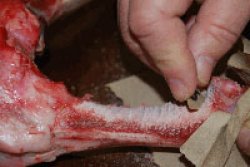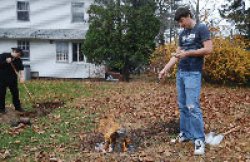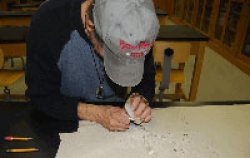Archaeology is the study of the human past. As such, archaeologists cannot directly observe the behavior of past peoples but must make reasoned inferences leading toward understanding and explaining patterning in the archaeological record. Many methods are used by archaeologists to produce plausible reconstructions of past human behavior. Archaeology by experiment is one way that investigators gain valuable insights into how people did things in the past.
ANTH370 introduces the concepts, methods and theory of experimental archaeology. In this course, students explore the history of experimental archaeology through a series of case studies. The methods and goals of experimental archaeology will be compared to the closely related field of ethnoarchaeology.
Through selected readings and hands-on experiments, ANTH370 explores these fundamentally important questions asked by archaeologists:
- How do archaeologists know what they know?
- How is the archaeological record formed?
Prerequisite: ANTH 103 (Prehistoric Archaeology)



About the Instructor
Peter Siegel, PhD
Email: sieglep@montclair.edu
Phone: 973-655-3415
Dr. Siegel is associate professor of anthropology at Montclair State University. Prior to joining the Montclair State faculty in 2006, Dr. Siegel worked for 14 years in the applied sector of heritage management. In that job, he conducted archaeological projects throughout the Mid-Atlantic and Northeast regions of the United States, Puerto Rico, U.S. Virgin Islands and South America. His major areas of interest lie in the pre-Columbian archaeology of the Caribbean, lowland South America and eastern North America.
Since coming to Montclair State University, Dr. Siegel has obtained two grants from the National Science Foundation and one from the National Geographic Society to pursue research into human-land relations in the pre-Columbian Caribbean. He assembled a swat team of crack researchers from around the country to journey to the Caribbean islands with the goal of reconstructing ancient environments and human impacts on them. The team includes Jason Curtis (geochemist, University of Florida, Gainesville), Nick Dunning (geoarchaeologist, University of Cincinnati), Pat Farrell (geoarchaeologist, University of Minnesota), John Jones (palynologist, Washington State University, Pullman) and Debby Pearsall (paleoethnobotanist, University of Missouri, Columbia). Cores were taken from selected wetlands on Trinidad, Grenada, Curacao, Barbados, Martinique, Marie-Galante (Guadeloupe), Antigua, Barbuda and St. Croix to collect preserved microfossils to help in reconstructing past environments and landscape conditions.
In addition to teaching and doing archaeology, Siegel enjoys juggling and playing blues harmonica.
